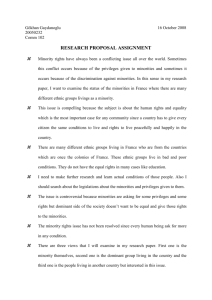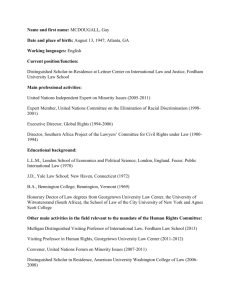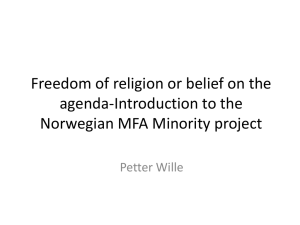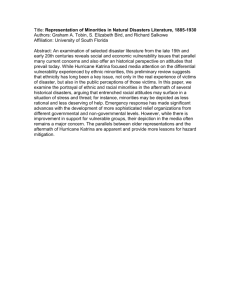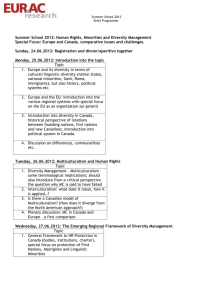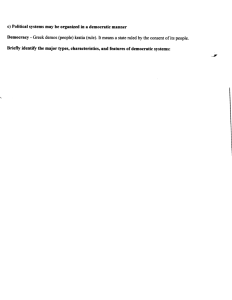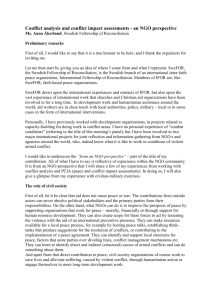Minorities at Risk Project
advertisement
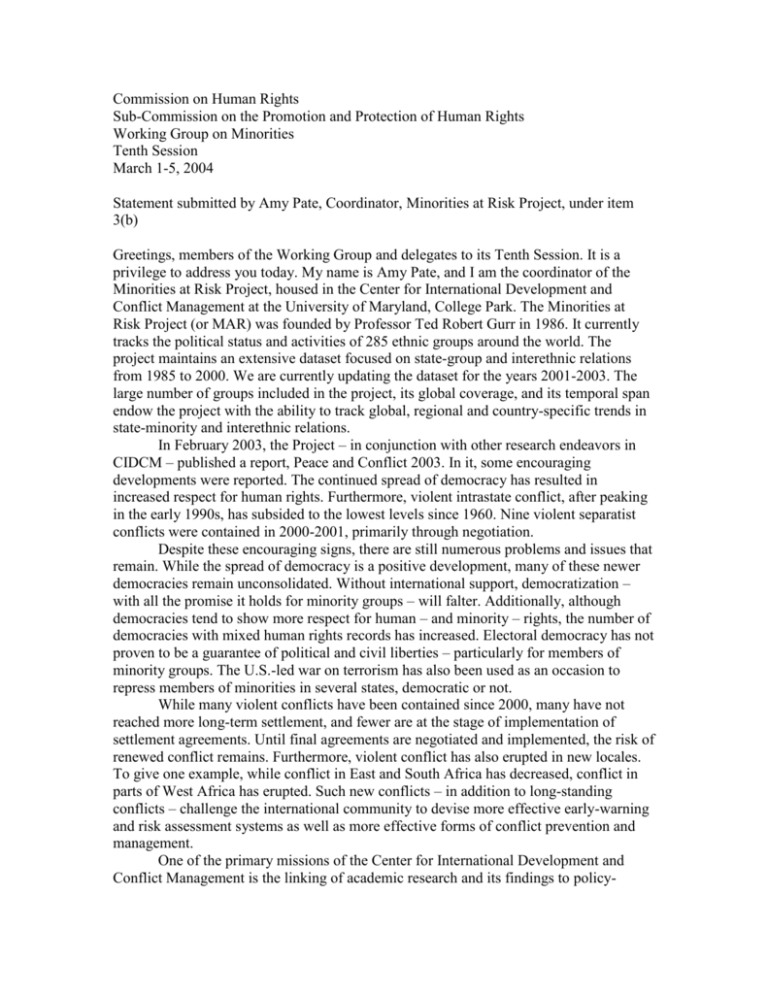
Commission on Human Rights Sub-Commission on the Promotion and Protection of Human Rights Working Group on Minorities Tenth Session March 1-5, 2004 Statement submitted by Amy Pate, Coordinator, Minorities at Risk Project, under item 3(b) Greetings, members of the Working Group and delegates to its Tenth Session. It is a privilege to address you today. My name is Amy Pate, and I am the coordinator of the Minorities at Risk Project, housed in the Center for International Development and Conflict Management at the University of Maryland, College Park. The Minorities at Risk Project (or MAR) was founded by Professor Ted Robert Gurr in 1986. It currently tracks the political status and activities of 285 ethnic groups around the world. The project maintains an extensive dataset focused on state-group and interethnic relations from 1985 to 2000. We are currently updating the dataset for the years 2001-2003. The large number of groups included in the project, its global coverage, and its temporal span endow the project with the ability to track global, regional and country-specific trends in state-minority and interethnic relations. In February 2003, the Project – in conjunction with other research endeavors in CIDCM – published a report, Peace and Conflict 2003. In it, some encouraging developments were reported. The continued spread of democracy has resulted in increased respect for human rights. Furthermore, violent intrastate conflict, after peaking in the early 1990s, has subsided to the lowest levels since 1960. Nine violent separatist conflicts were contained in 2000-2001, primarily through negotiation. Despite these encouraging signs, there are still numerous problems and issues that remain. While the spread of democracy is a positive development, many of these newer democracies remain unconsolidated. Without international support, democratization – with all the promise it holds for minority groups – will falter. Additionally, although democracies tend to show more respect for human – and minority – rights, the number of democracies with mixed human rights records has increased. Electoral democracy has not proven to be a guarantee of political and civil liberties – particularly for members of minority groups. The U.S.-led war on terrorism has also been used as an occasion to repress members of minorities in several states, democratic or not. While many violent conflicts have been contained since 2000, many have not reached more long-term settlement, and fewer are at the stage of implementation of settlement agreements. Until final agreements are negotiated and implemented, the risk of renewed conflict remains. Furthermore, violent conflict has also erupted in new locales. To give one example, while conflict in East and South Africa has decreased, conflict in parts of West Africa has erupted. Such new conflicts – in addition to long-standing conflicts – challenge the international community to devise more effective early-warning and risk assessment systems as well as more effective forms of conflict prevention and management. One of the primary missions of the Center for International Development and Conflict Management is the linking of academic research and its findings to policy- makers and practitioners of conflict management. Center activities have contributed to conflict management training programs in 15 countries. The data projects housed in the center have been used by various national and international agencies. In this vein, MAR has developed analytic narratives and risk assessments for each group covered by the project, focusing on those factors which research has identified as facilitating or inhibiting state-group conflict. Additionally, the project is developing the capacity to create statistical summaries for groups, states and regions. Finally, to be more relevant to conflict management practitioners, we are developing a methodology for structured comparison between similarly situated groups. This project – called CASES – will allow members of minorities and representatives of states to step outside their own conflict experiences and view the situation in their countries through the lens of similar conflicts elsewhere. The core of a CASES report will be analytic narratives of possible pathways a conflict may take based on what policy options are implemented. While this type of scenario analysis is not uncommon, CASES will be unique in that is draws explicit, empirically grounded analogies with other conflicts involving similarly situated groups. The staff of MAR and the larger Center, in addition to affiliated scholars at other institutions, strongly feel that we can provide theoretically grounded and empirically validated models and methodologies to assist policy-makers and practitioners in the arena of greater inclusion of minority groups in state polities and in the reduction of stateminority and interethnic conflict. Our ability to do so, however, depends largely on the quality and reliability of the information available to us. For this reason, we are building a network of expert scholars to assess the validity of our data. Furthermore, we are beginning to build contacts within and relationships with non-governmental organizations focused on advocacy and monitoring. We believe that the interaction of the scholarly, policy and advocacy communities is crucial to the continued efficacy of each.

